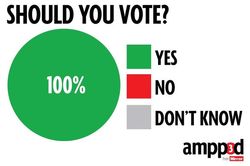Young Adult
|
An autumn prayer
Show us, O Lord, your face of light in the coldness of morning, in the song of the stream, in the beckoning of autumn. Make shine, O Lord, your face of fire on the mist of the lakes on the trunks of the trees on the crust of the rocks. Lift up, O Lord, your Easter face on the refrain of hours on the passing days, on the dance of the seasons. Make shine, O Lord, thy face of goodness on the noon rain, on the rusted leaves, on the birds’ migration. Bring forth, O Lord, your face of peace through the murmur of things, through the music of silence, through the smile of words. Lead us, O Lord, in the light of your face toward the courtyards of Jerusalem, toward the paths of eternity, to the house of our Father. Jacques Gauthier, Prayers for all seasons |

It is probably not a surprise to you that there is an election coming up. As Catholics we have a responsibility to take part in the election and vote. With how crazy this particular election has been there are plenty of people who would rather not...but that is something that we can really do.
This video (though it has a few pictures from the last election) is very good at explaining why and how Catholics should look at voting, better known as faithful citizenship. Check it out!
This video (though it has a few pictures from the last election) is very good at explaining why and how Catholics should look at voting, better known as faithful citizenship. Check it out!
Catholics constitute at least 25 percent of voters in national elections. By their votes, these millions of Catholics have the power to make our country a better nation, more welcoming to life, more supportive of families, and more effective in its programs to help the poor and marginalized.
The following introduces the general principles of Catholic moral and social teaching and how they apply to specific issues facing voters in the next election, including health care, immigration, the economy, education, and religious liberty. Catholics will come to understand the difference between principle and prudential judgment, as well as why some issues are more important in political thinking than others—dispelling the myth, for example, that caring about the protection of unborn life makes one a “single-issue” voter.
Pope Francis and the United States bishops have called on Catholics to renew their participation in American political life. That participation means, above all, taking the moral and social principles of the Catholic Faith into the voting booth. Catholics can affirm that their participation in the political process is not an imposition of their faith on others but rather a service to the common good that is shared equally by all human persons.
Issues for Catholic Voters – In Brief:
Catholics should be guided by a few basic principles when considering their participation in politics. Catholics are obliged to participate in politics by voting. Their legislators are elected to serve and protect the common good, human dignity, and rights of human persons. As voters, they should have a clear understanding of the principles of Catholic moral and social teaching. Here are some issues to consider
Abortion
http://www.catholicadvocate.com/
The following introduces the general principles of Catholic moral and social teaching and how they apply to specific issues facing voters in the next election, including health care, immigration, the economy, education, and religious liberty. Catholics will come to understand the difference between principle and prudential judgment, as well as why some issues are more important in political thinking than others—dispelling the myth, for example, that caring about the protection of unborn life makes one a “single-issue” voter.
Pope Francis and the United States bishops have called on Catholics to renew their participation in American political life. That participation means, above all, taking the moral and social principles of the Catholic Faith into the voting booth. Catholics can affirm that their participation in the political process is not an imposition of their faith on others but rather a service to the common good that is shared equally by all human persons.
Issues for Catholic Voters – In Brief:
Catholics should be guided by a few basic principles when considering their participation in politics. Catholics are obliged to participate in politics by voting. Their legislators are elected to serve and protect the common good, human dignity, and rights of human persons. As voters, they should have a clear understanding of the principles of Catholic moral and social teaching. Here are some issues to consider
Abortion
- Abortion is the dominant political issue.
- Catholics can justly support politicians who advocate incremental means toward eliminating abortion.
- The ban against euthanasia and assisted suicide admits of no exception.
- Removing extraordinary means of supporting life is allowable as a prudential judgment.
- Since science serves human ends, not its own, scientific research must always respect the moral law.
- Science must respect the inherent dignity of the human person.
- Unused and unwanted embryos must be treated with the respect afforded to other human beings.
- Ending human life cannot be justified in the name of therapeutic (i.e., medical) benefits to other persons.
- The Church teaches that the death penalty is acceptable in principle but should be avoided in practice.
- The responsibility of elected officials is to ensure that penal systems and sentencing policies do in fact protect society from known aggressors.
- The practical elimination of the death penalty is based upon the strength of the penal system.
- States have the right to engage in war in self-defense but should first exhaust all peaceful solutions.
- Just war is waged within defined moral boundaries in regard to its targets, goals, and outcomes.
- Political leadership must have both the inclination toward peace and the capacity for decisive action if war is just and necessary.
- Nations have a duty to protect their citizens from legitimate threats.
- Nations should build their capacity for defense in light of just-war theory.
- Terrorism—the injury and murder of innocent civilians—is never justified.
- Defending a nation combines the military, international diplomacy, and a compassionate foreign policy.
- Judges should be evaluated according to their judicial records and commitment to the limited judicial role, not attacked for their privately held religious views.
- Those who would nominate and confirm judicial activists disenfranchise the faithful Catholic voter.
- Marriage was instituted prior to the state and should be recognized by the state as something inviolate and necessary to the common good.
- Prudential judgments about law and public policy should always seek to strengthen marriage and families.
- Parents—not the state—have the right to educate their children.
- Catholic parents have the right to have their children educated in a curriculum consonant with Catholic values.
- Governments should provide financial support to families for the education they desire for their children.
- Work is a matter of human dignity and is necessary to the common good.
- Government should create the conditions that support business and industry development.
- Corporate responsibility is critical in helping to maintain economic success.
- Taxes should be fairly based upon one’s ability to pay.
- Tax policy should not penalize marriage or the raising of children.
- Corporate taxes should not threaten the capacity to create and sustain jobs.
- The preferential option for the poor requires that authorities first provide assistance to the poor and oppressed.
- The poor must have access to the education and job training necessary to compete in today’s job market.
- Strong families that remain intact keep their members from falling into poverty.
- Health-care needs should be met by a combination of personal and corporate insurance, philanthropy, and government programs.
- Catholic health-care organizations must be free to perform their work with clear consciences.
- Religious expression is a human right that should be recognized by the state.
- States that enforce secularism in social services and education are violating religious liberty.
- Political debate naturally involves religious concepts since law and public policy directly affect the common good.
- A nation should seek to accommodate the immigrant who, for just reasons, seeks greater access to the basic goods of life.
- Political leaders and citizens should recognize the reality of human interdependence that crosses all borders and all national identities.
- The immigrant is a person who deserves the same protection of law and social benefits afforded to citizens.
- From creation, human beings are given special responsibility as stewards of the earth.
- As part of its duty to the common good, the government should prevent unnecessary harm to natural resources.
- Government should also use creative and technological skill, in concert with global cooperation, to reverse existing environmental damage.
http://www.catholicadvocate.com/







